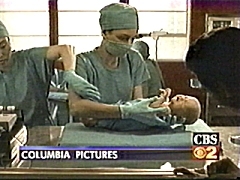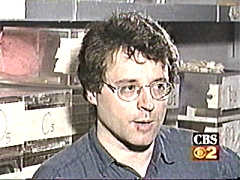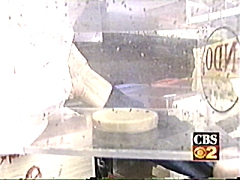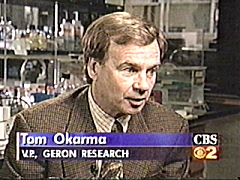 |
 |
 |
 |
| |
||||
Forever Young? Part IIIA CBS 2 News Special Assignment  Science is closer than ever before to unlocking the secrets of aging. Science is closer than ever before to unlocking the secrets of aging. The genetic engineering and cryogenic freezing theorized in science fiction movies might soon be a reality. Could humans live to be more than 200 years old? Or even older? CBS 2 News' U-Team health expert Dr. Harlan Gibbs introduces us to the scientists who might some day help us all stay forever young. Special Assignment: Forever Young? Part III aired Wednesday, September 24, 1998 at 11 p.m. Editor's note: Forever Young? Part II aired Tuesday, September 23, 1998 at 11 p.m. and Forever Young? Part I aired Monday, September 22, 1998 at 11 p.m. Scientists believe that like the movie, someday we'll know our exact genetic makeup and live longer by preventing diseases, reported CBS 2 News' Dr. Harlan Gibbs. Our bodies, instead of dying, will be frozen and reawakened years from now. Is it all just science fiction? Not according to Russel Chaney, who believes in cryonics. That's the process of freezing people in liquid nitrogen and bringing them back to life in the future. So Chaney (pictured, right) is spending over $100,000 to be put in a nitrogen tank when he dies. "There's actually liquid nitrogen inside this giant thermos, and the patient is stored inside," Chaney told Dr. Gibbs. You can choose to have a full-body suspension, or a neuro-suspension, said Dr. Gibbs. The latter is just your head. "I decided to do the whole thing," Chaney said with a laugh. "The biggest problem that whole line of work faces is that nobody has succeeded in bringing a mammal back," said Dr. Michael Rose, a biologist at the University of California, Irvine. Dr. Rose (pictured, left) is working on a very different way to help us live longer, reported Dr. Gibbs. Through selective breeding, he has nearly tripled the lifespan of fruit flies. "These flies took 18 years to create," Dr. Rose told Dr. Gibbs. With a stronger genetic makeup, these flies live longer, are healthier and they have more sex. Fruit flies might seem like a stretch for discovering the keys to human aging. But by studying these insects, scientists are finding the answers that might eventually lead to longer and healthier lives for all of us. Dr. Edward Schneider, a gerontologist at the Univerisity of Southern California, believes there might be another way to fight aging that's just 20 years away. "Then what we can do is screen children early on, modify their diet, modify their environment, perhaps give them a few pills, and wipe out most of today's killers," Dr. Schneider told Dr. Gibbs. "We all know people older than we who are healthier in certain organ systems than we are 20 or 30 years their junior," Tom Okarma, Vice President of Geron, told CBS 2 News. "There's a reason for that, and the Geron Corporation is trying to get at that reason." What they've found is quite encouraging, said Dr. Gibbs. Within every cell, there are chromosomes. And at the end of every chromosome, there are telemeers. "Telemeers are essentially the clock that keeps track of how many times a cell divides, "Geron's chief scientist, Cal Harley, told Dr. Gibbs. It's a crucial discovery, said Dr. Gibbs. But in Dr. Rose's opinion, it's just as important as the first test. "We're developing brand new approaches to medical problems. With this completely new style of medical technology, if it was fully developed, I don't think there are any real limits to human lifespan," Dr. Rose said. Regardless of how extreme the idea might be, cryonics, fruit flies and telemeers are all part of the science fiction equation that could bring our lifespan to more than 200 years. But for right now, said Dr. Gibbs, it's eat right, exercise and keep a smile on your face.
|
|
 |
|
 |
||
|
12 p.m.
Woman 2 Woman Holiday Decorating Tips 5 p.m. 6 p.m. 11 p.m.
|
||
 |
||
|
4-5 p.m.
Judge Judy Judy Justice! 8 p.m. 9 p.m. 10 p.m.
|
||
| |
||
 "Ten fingers, 10 toes. That's all that used to matter," actor Ethan Hawke narrates in the futuristic movie "Gattica." "Now, only seconds old, the exact time and cause of my death is already known."
"Ten fingers, 10 toes. That's all that used to matter," actor Ethan Hawke narrates in the futuristic movie "Gattica." "Now, only seconds old, the exact time and cause of my death is already known."  "I'm 57 years old. I understand there's not enough time in a normal life-span to see and do everything that this world offers,"Chaney told CBS 2 News. "The future has so many possibilities that we can't even dream of today,"
"I'm 57 years old. I understand there's not enough time in a normal life-span to see and do everything that this world offers,"Chaney told CBS 2 News. "The future has so many possibilities that we can't even dream of today,"  But there is a hitch.
But there is a hitch.  "If you think of this in athletic terms, it would be like being the quarterback for the San Francisco 49ers for 30 or 40 years," said Dr. Rose. "And your peak performance, which might come at the age of 50, would be much higher than it is now."
"If you think of this in athletic terms, it would be like being the quarterback for the San Francisco 49ers for 30 or 40 years," said Dr. Rose. "And your peak performance, which might come at the age of 50, would be much higher than it is now."  Scientists at the Geron Corp. are taking this a step further. Not only are they studying ways to help cure diseases such as cancer, they're trying to stop the aging process altogether.
Scientists at the Geron Corp. are taking this a step further. Not only are they studying ways to help cure diseases such as cancer, they're trying to stop the aging process altogether.  They're our cells' aging clock. As our cells divide, telemeers get shorter and shorter. If we could make telemeers (pictured, right) last forever, theoretically our cells would never die -- and neither would we. On a cellular level, that's exactly what these scientists have done.
They're our cells' aging clock. As our cells divide, telemeers get shorter and shorter. If we could make telemeers (pictured, right) last forever, theoretically our cells would never die -- and neither would we. On a cellular level, that's exactly what these scientists have done. 

